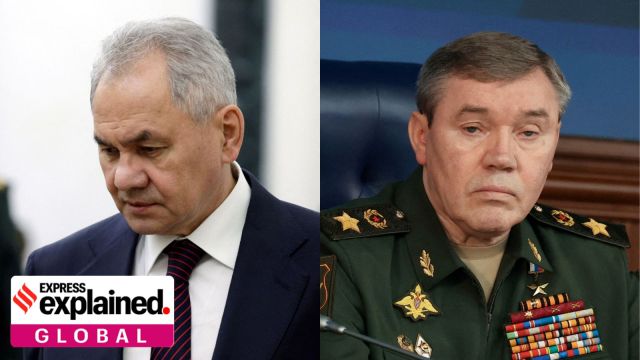ICC issues arrest warrants for Russian defence leaders: What does it effectively mean?
The ICC cited war crimes in Ukraine for issuing the warrants against Sergei Shoigu and Valery Gerasimov. Who are the Russian leaders and what effect does the move have on them?
 Russian Security Council's Secretary Sergei Shoigu (left) and Chief of the General Staff of Russian Armed Forces Valery Gerasimov. (Sputnik/Gavriil Grigorov/Pool and Mikhail Klimentyev/Kremlin via REUTERS)
Russian Security Council's Secretary Sergei Shoigu (left) and Chief of the General Staff of Russian Armed Forces Valery Gerasimov. (Sputnik/Gavriil Grigorov/Pool and Mikhail Klimentyev/Kremlin via REUTERS)The International Criminal Court (ICC) issued arrest warrants for former Russian Defence Minister Sergei Shoigu and current Chief of Staff of the Armed Forces Valery Gerasimov for “alleged international crimes” linked to the Ukraine war on Monday (June 24).
Last year, an ICC warrant for war crimes was also issued for Russian President Vladimir Putin. At the time, a Kremlin spokesperson said the questions that ICC raised about the war were “outrageous and unacceptable”.
According to the latest warrant, the new crimes were committed between at least October 10, 2022, and March 9, 2023. Here is what the charges say and what such warrants effectively mean.
Who are Shoigu and Gerasimov?
Shoigu was the Russian Defence Minister under whom the invasion of Ukraine began in February 2022. He was seen as a key Putin ally, having held his post for 12 years, and someone who could be entrusted to lead the war effort. He was somewhat abruptly removed from his post in May 2024, soon after Putin assumed the presidency for a fifth term.
After Putin and Shoigu, Gerasimov was considered the most powerful man in the government. He was appointed to his post and made the Deputy Defence Minister on November 9, 2012, three days after Shoigu was made defence minister.
However, both the leaders have suffered some damage to the positions they enjoyed previously since the war began. According to Reuters, nationalists in Russia have criticised them for failing to swiftly win a war against a much weaker opponent.
What do the ICC charges say?
Among the charges are “directing attacks at civilian objects” and “causing excessive incidental harm to civilians or damage to civilian objects”.
The ICC press release says there are reasonable grounds to believe the two officials bear individual criminal responsibility for committing the acts jointly and/or through others, ordering the commission of the crimes, and/or for their failure to exercise proper control over the forces under their command.
It further says, “There are reasonable grounds to believe that the two suspects bear responsibility for missile strikes carried out by the Russian armed forces against the Ukrainian electric infrastructure…” It adds that these strikes constitute conduct which involves multiple acts against a civilian population.
What is the ICC?
The ICC, headquartered in The Hague, Netherlands, was established under a 1998 treaty called the “Rome Statute”. It “investigates and, where warranted, tries individuals charged with the gravest crimes of concern to the international community: genocide, war crimes, crimes against humanity and the crime of aggression.”
Presently, 123 countries are party to the Rome Statute, including Britain, Japan, Afghanistan, and Germany. However, the USA has kept its distance, maintaining that the ICC should not exercise jurisdiction over citizens of countries that are not a party to it. Similarly, India and China have also abstained from membership.
The ICC was established to prosecute the most heinous offences only when a country’s own legal machinery fails to act, as was the case in former Yugoslavia and Rwanda. Unlike the International Court of Justice (ICJ), which deals with countries and inter-state disputes, the ICC prosecutes individuals. However, the ICC’s jurisdiction is limited to offences occurring after it came into effect on July 1, 2002.
Additionally, the offences should be committed either in a country that ratified the agreement or by a national of a ratifying country. The ICC can also practice its jurisdiction over cases referred by the UN Security Council to it.
Does ICC have the power to prosecute Russia?
Following the charges against Putin, Kremlin spokesman Dmitry Peskov had said that any decision of the court was “null and void” due to Russia not being an ICC member.
However, it created a situation where Putin risks arrest every time he travels. If Putin or the two leaders travel to a state party to the ICC, then that country must arrest them, according to its obligations under international law. Along with the existing sanctions in the West, the latest move will likely further deepen Russia’s isolation from the West.
The warrant against Putin marked the first time that the ICC has issued an arrest warrant against one of the five permanent members of the UN Security Council.
Does Ukraine recognise ICC’s jurisdiction?
According to the ICC’s official website, “Ukraine is not a State Party to the Rome Statute”, but it has twice exercised its options to accept ICC’s jurisdiction over alleged crimes under the Rome Statute, occurring on its territory, under Article 12(3) of the Statute.
Article 12(3) states that if the acceptance of a state that is not a party to the statute is required, the state may accept the jurisdiction of the court for a crime concerned, by making a declaration to the Registrar and cooperating without any delay or exception.
- 01
- 02
- 03
- 04
- 05






































